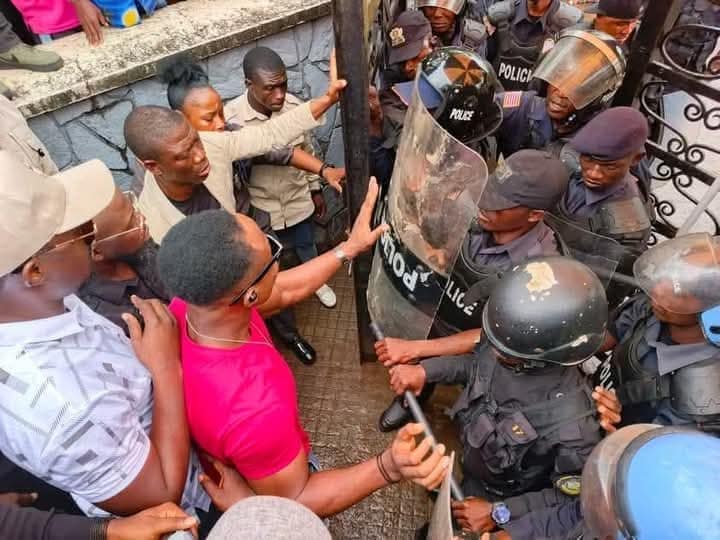The Liberian House of Representatives is embroiled in a constitutional crisis, marked by escalating tensions and a blatant disregard for the rule of law. The conflict centers around embattled House Speaker J. Fonati Koffa and a dissenting majority bloc that has been holding separate legislative sessions, effectively paralyzing the House’s ability to function. This power struggle culminated in a chaotic clash between riot police and minority bloc members supporting Speaker Koffa on December 9, 2024. The violence erupted as the majority bloc attempted to hold a budget hearing, an action deemed illegal by a recent Supreme Court ruling. The Court declared any legislative actions taken outside the framework of Articles 33 and 49 of the Constitution to be “ultra vires,” meaning beyond their legal authority.
The root of the conflict appears to be twofold: Speaker Koffa’s intention to audit the 54th Legislature and his resistance to alleged budget manipulation. Sources suggest that a substantial sum of money, potentially US$90 million, was concealed within the 2024 budget for distribution among lawmakers. Speaker Koffa reportedly refused a US$5 million portion of this sum, solidifying his position as an obstacle to certain members’ financial interests. This defiance, coupled with his pursuit of an audit, has made him a target for removal.
The majority bloc, seemingly emboldened by executive branch support, has consistently defied the Supreme Court ruling and continued to operate outside established legal procedures. Their actions have been met with resistance from Speaker Koffa and the minority bloc, leading to the violent confrontation on Capitol Hill. The deployment of riot police to protect the majority bloc’s unauthorized budget hearing further underscores the executive branch’s complicity in undermining the rule of law. This interference has exacerbated the crisis and raises serious concerns about the separation of powers within the Liberian government.
The Supreme Court’s intervention, declaring the majority bloc’s actions illegal, aimed to restore order and uphold constitutional principles. However, the majority bloc, with apparent executive backing, has ignored the ruling, further deepening the crisis. Speaker Koffa, while urging adherence to the Supreme Court’s decision, has firmly stated that resignation is not an option. He has also warned spending entities against participating in hearings not authorized by the legitimate House leadership, emphasizing that any decisions arising from such hearings would be legally invalid.
The escalating tension and disregard for legal processes have transformed the Liberian House of Representatives into a dysfunctional body, unable to fulfill its constitutional duties. The majority bloc’s actions, coupled with the executive branch’s apparent support, have created a dangerous precedent, undermining the rule of law and threatening the integrity of Liberia’s democratic institutions. The continued defiance of the Supreme Court’s ruling raises serious questions about the future of the legislative process and the stability of the Liberian government.
The future of the Liberian House of Representatives hangs in the balance. The ongoing conflict between Speaker Koffa, the minority bloc, and the majority bloc, backed by the executive branch, has created a constitutional crisis with far-reaching implications. The disregard for the rule of law, the blatant defiance of Supreme Court rulings, and the use of force to suppress dissent paint a troubling picture of Liberia’s political landscape. The resolution of this crisis will require a commitment to constitutional principles, respect for the judiciary, and a willingness to prioritize the interests of the Liberian people over personal gain. The international community must also play a role in urging all parties to uphold democratic norms and ensure a peaceful resolution to the crisis. Failure to address this situation decisively could lead to further instability and erode public trust in the Liberian government.














